Challenges of Managing Talent in the Hospitality Sector Research
VerifiedAdded on 2023/01/11
|19
|4574
|85
Report
AI Summary
This research project examines the challenges of managing talent within the hospitality sector, with a specific focus on the InterContinental Hotels Group. The study begins with an introduction to the topic, outlining the research rationale, questions, aims, objectives, and significance. A comprehensive literature review explores the concepts of talent management, its significance, and its impact on organizational productivity, as well as the challenges faced by management and potential solutions. The methodology section details the research philosophy, approach, methods, instruments, sampling strategies, and ethical considerations. The report includes data analysis, interpretation, and a conclusion that offers recommendations and implications for further research. Key findings highlight the importance of talent management, challenges like encouraging passion and offering competitive salaries, and strategies such as smart hiring and leadership development. The research aims to provide insights into overcoming these challenges and improving talent management practices within the hospitality industry.
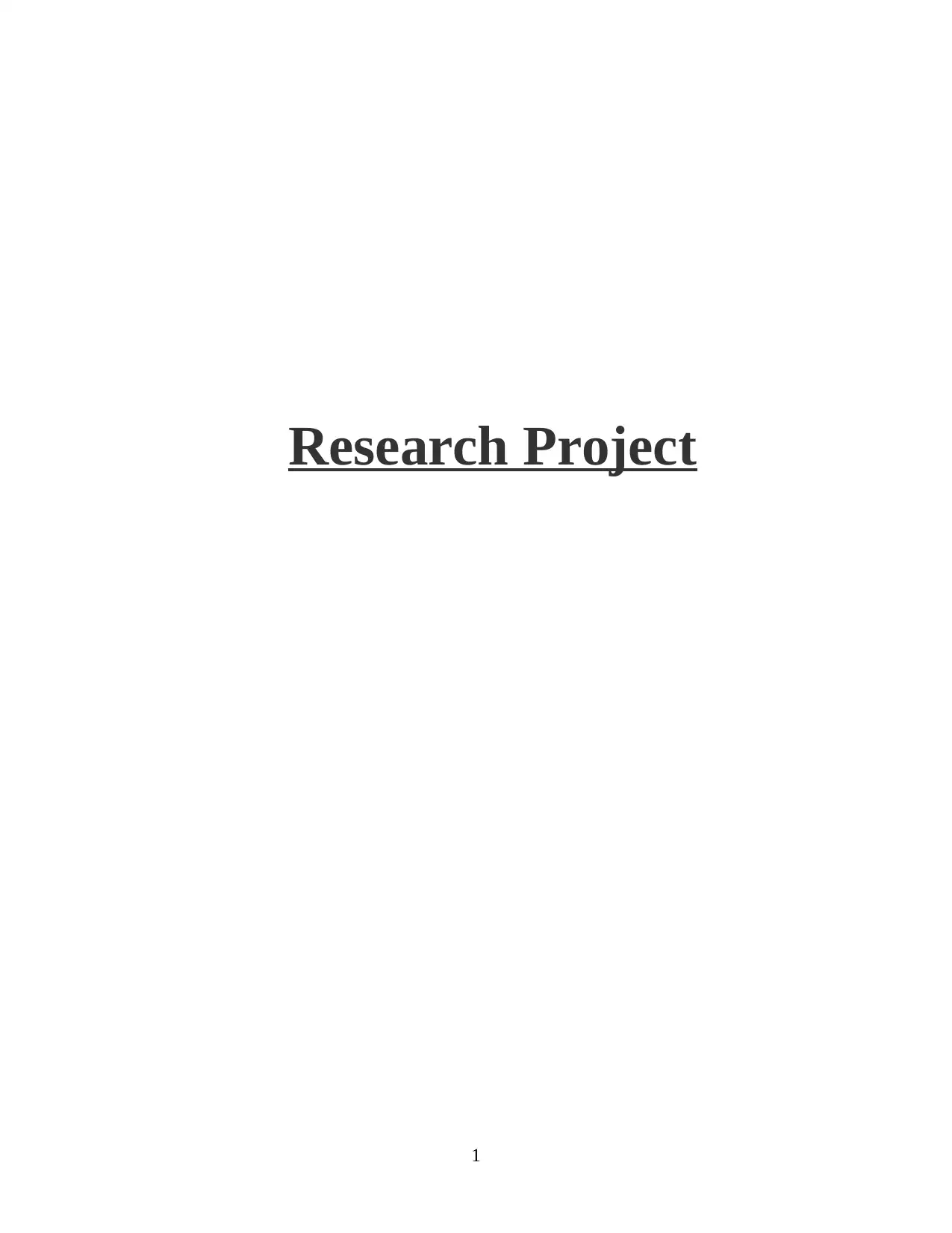
Research Project
1
1
Paraphrase This Document
Need a fresh take? Get an instant paraphrase of this document with our AI Paraphraser
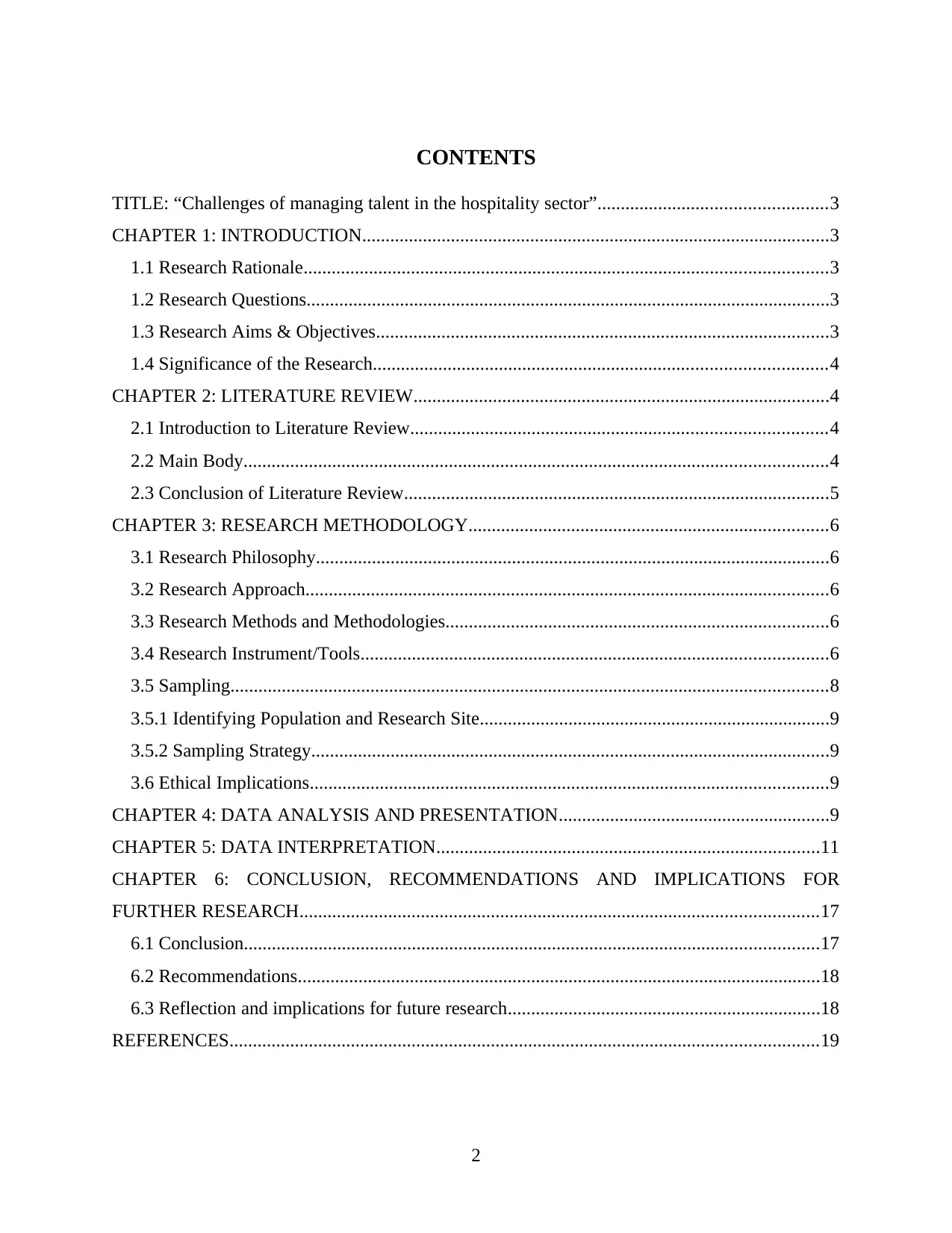
CONTENTS
TITLE: “Challenges of managing talent in the hospitality sector”.................................................3
CHAPTER 1: INTRODUCTION....................................................................................................3
1.1 Research Rationale................................................................................................................3
1.2 Research Questions................................................................................................................3
1.3 Research Aims & Objectives.................................................................................................3
1.4 Significance of the Research.................................................................................................4
CHAPTER 2: LITERATURE REVIEW.........................................................................................4
2.1 Introduction to Literature Review.........................................................................................4
2.2 Main Body.............................................................................................................................4
2.3 Conclusion of Literature Review...........................................................................................5
CHAPTER 3: RESEARCH METHODOLOGY.............................................................................6
3.1 Research Philosophy..............................................................................................................6
3.2 Research Approach................................................................................................................6
3.3 Research Methods and Methodologies..................................................................................6
3.4 Research Instrument/Tools....................................................................................................6
3.5 Sampling................................................................................................................................8
3.5.1 Identifying Population and Research Site...........................................................................9
3.5.2 Sampling Strategy...............................................................................................................9
3.6 Ethical Implications...............................................................................................................9
CHAPTER 4: DATA ANALYSIS AND PRESENTATION..........................................................9
CHAPTER 5: DATA INTERPRETATION..................................................................................11
CHAPTER 6: CONCLUSION, RECOMMENDATIONS AND IMPLICATIONS FOR
FURTHER RESEARCH...............................................................................................................17
6.1 Conclusion...........................................................................................................................17
6.2 Recommendations................................................................................................................18
6.3 Reflection and implications for future research...................................................................18
REFERENCES..............................................................................................................................19
2
TITLE: “Challenges of managing talent in the hospitality sector”.................................................3
CHAPTER 1: INTRODUCTION....................................................................................................3
1.1 Research Rationale................................................................................................................3
1.2 Research Questions................................................................................................................3
1.3 Research Aims & Objectives.................................................................................................3
1.4 Significance of the Research.................................................................................................4
CHAPTER 2: LITERATURE REVIEW.........................................................................................4
2.1 Introduction to Literature Review.........................................................................................4
2.2 Main Body.............................................................................................................................4
2.3 Conclusion of Literature Review...........................................................................................5
CHAPTER 3: RESEARCH METHODOLOGY.............................................................................6
3.1 Research Philosophy..............................................................................................................6
3.2 Research Approach................................................................................................................6
3.3 Research Methods and Methodologies..................................................................................6
3.4 Research Instrument/Tools....................................................................................................6
3.5 Sampling................................................................................................................................8
3.5.1 Identifying Population and Research Site...........................................................................9
3.5.2 Sampling Strategy...............................................................................................................9
3.6 Ethical Implications...............................................................................................................9
CHAPTER 4: DATA ANALYSIS AND PRESENTATION..........................................................9
CHAPTER 5: DATA INTERPRETATION..................................................................................11
CHAPTER 6: CONCLUSION, RECOMMENDATIONS AND IMPLICATIONS FOR
FURTHER RESEARCH...............................................................................................................17
6.1 Conclusion...........................................................................................................................17
6.2 Recommendations................................................................................................................18
6.3 Reflection and implications for future research...................................................................18
REFERENCES..............................................................................................................................19
2
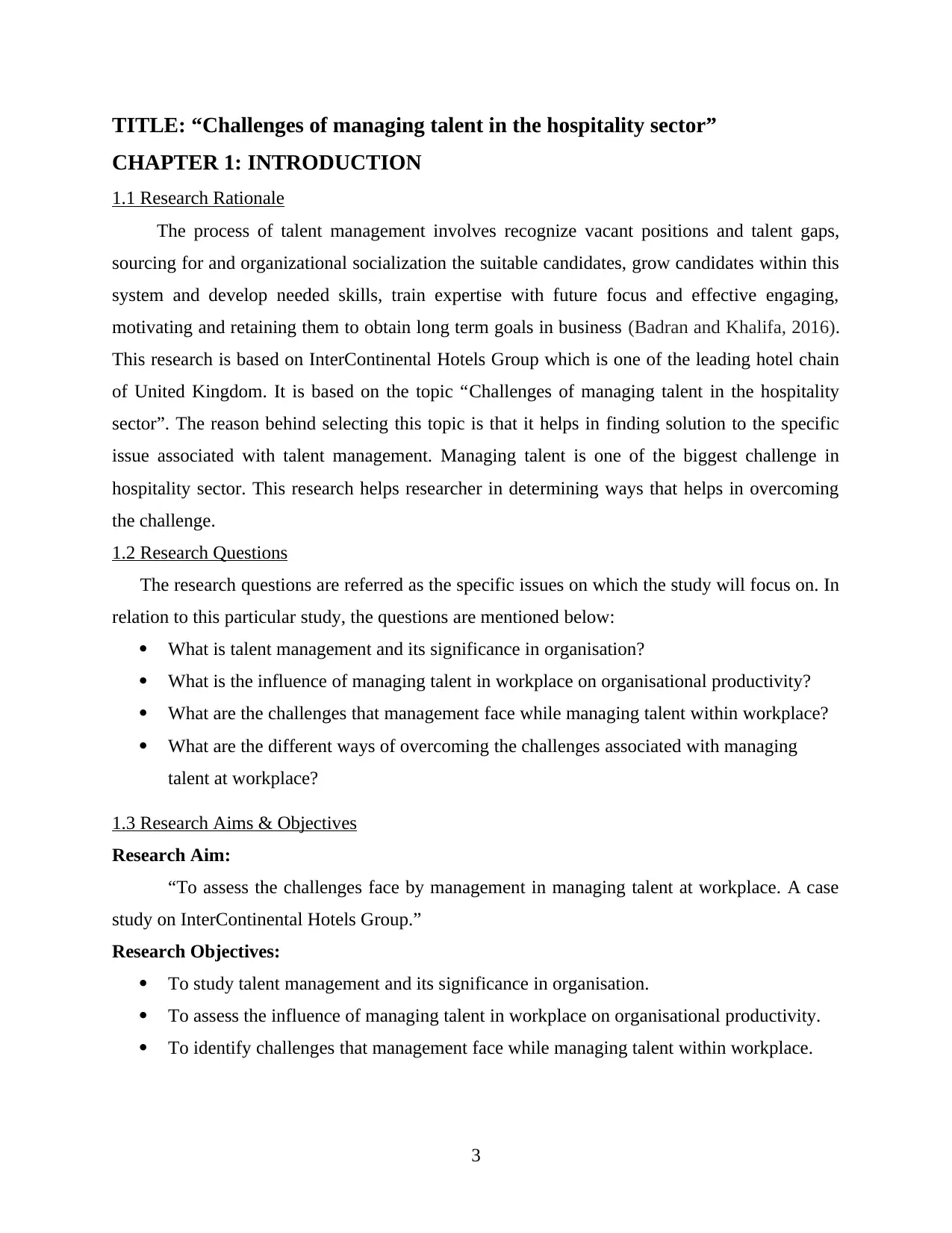
TITLE: “Challenges of managing talent in the hospitality sector”
CHAPTER 1: INTRODUCTION
1.1 Research Rationale
The process of talent management involves recognize vacant positions and talent gaps,
sourcing for and organizational socialization the suitable candidates, grow candidates within this
system and develop needed skills, train expertise with future focus and effective engaging,
motivating and retaining them to obtain long term goals in business (Badran and Khalifa, 2016).
This research is based on InterContinental Hotels Group which is one of the leading hotel chain
of United Kingdom. It is based on the topic “Challenges of managing talent in the hospitality
sector”. The reason behind selecting this topic is that it helps in finding solution to the specific
issue associated with talent management. Managing talent is one of the biggest challenge in
hospitality sector. This research helps researcher in determining ways that helps in overcoming
the challenge.
1.2 Research Questions
The research questions are referred as the specific issues on which the study will focus on. In
relation to this particular study, the questions are mentioned below:
What is talent management and its significance in organisation?
What is the influence of managing talent in workplace on organisational productivity?
What are the challenges that management face while managing talent within workplace?
What are the different ways of overcoming the challenges associated with managing
talent at workplace?
1.3 Research Aims & Objectives
Research Aim:
“To assess the challenges face by management in managing talent at workplace. A case
study on InterContinental Hotels Group.”
Research Objectives:
To study talent management and its significance in organisation.
To assess the influence of managing talent in workplace on organisational productivity.
To identify challenges that management face while managing talent within workplace.
3
CHAPTER 1: INTRODUCTION
1.1 Research Rationale
The process of talent management involves recognize vacant positions and talent gaps,
sourcing for and organizational socialization the suitable candidates, grow candidates within this
system and develop needed skills, train expertise with future focus and effective engaging,
motivating and retaining them to obtain long term goals in business (Badran and Khalifa, 2016).
This research is based on InterContinental Hotels Group which is one of the leading hotel chain
of United Kingdom. It is based on the topic “Challenges of managing talent in the hospitality
sector”. The reason behind selecting this topic is that it helps in finding solution to the specific
issue associated with talent management. Managing talent is one of the biggest challenge in
hospitality sector. This research helps researcher in determining ways that helps in overcoming
the challenge.
1.2 Research Questions
The research questions are referred as the specific issues on which the study will focus on. In
relation to this particular study, the questions are mentioned below:
What is talent management and its significance in organisation?
What is the influence of managing talent in workplace on organisational productivity?
What are the challenges that management face while managing talent within workplace?
What are the different ways of overcoming the challenges associated with managing
talent at workplace?
1.3 Research Aims & Objectives
Research Aim:
“To assess the challenges face by management in managing talent at workplace. A case
study on InterContinental Hotels Group.”
Research Objectives:
To study talent management and its significance in organisation.
To assess the influence of managing talent in workplace on organisational productivity.
To identify challenges that management face while managing talent within workplace.
3
⊘ This is a preview!⊘
Do you want full access?
Subscribe today to unlock all pages.

Trusted by 1+ million students worldwide
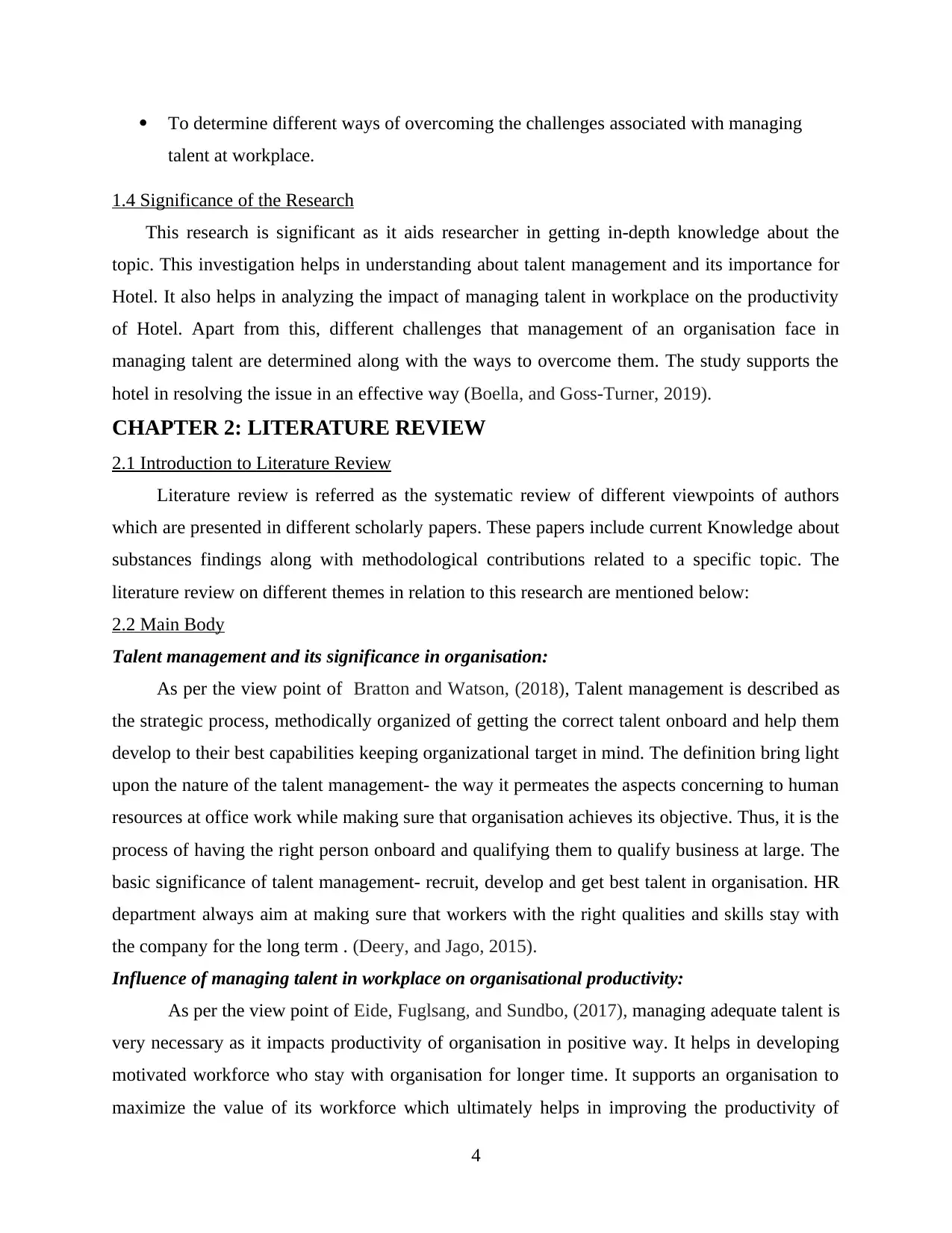
To determine different ways of overcoming the challenges associated with managing
talent at workplace.
1.4 Significance of the Research
This research is significant as it aids researcher in getting in-depth knowledge about the
topic. This investigation helps in understanding about talent management and its importance for
Hotel. It also helps in analyzing the impact of managing talent in workplace on the productivity
of Hotel. Apart from this, different challenges that management of an organisation face in
managing talent are determined along with the ways to overcome them. The study supports the
hotel in resolving the issue in an effective way (Boella, and Goss-Turner, 2019).
CHAPTER 2: LITERATURE REVIEW
2.1 Introduction to Literature Review
Literature review is referred as the systematic review of different viewpoints of authors
which are presented in different scholarly papers. These papers include current Knowledge about
substances findings along with methodological contributions related to a specific topic. The
literature review on different themes in relation to this research are mentioned below:
2.2 Main Body
Talent management and its significance in organisation:
As per the view point of Bratton and Watson, (2018), Talent management is described as
the strategic process, methodically organized of getting the correct talent onboard and help them
develop to their best capabilities keeping organizational target in mind. The definition bring light
upon the nature of the talent management- the way it permeates the aspects concerning to human
resources at office work while making sure that organisation achieves its objective. Thus, it is the
process of having the right person onboard and qualifying them to qualify business at large. The
basic significance of talent management- recruit, develop and get best talent in organisation. HR
department always aim at making sure that workers with the right qualities and skills stay with
the company for the long term . (Deery, and Jago, 2015).
Influence of managing talent in workplace on organisational productivity:
As per the view point of Eide, Fuglsang, and Sundbo, (2017), managing adequate talent is
very necessary as it impacts productivity of organisation in positive way. It helps in developing
motivated workforce who stay with organisation for longer time. It supports an organisation to
maximize the value of its workforce which ultimately helps in improving the productivity of
4
talent at workplace.
1.4 Significance of the Research
This research is significant as it aids researcher in getting in-depth knowledge about the
topic. This investigation helps in understanding about talent management and its importance for
Hotel. It also helps in analyzing the impact of managing talent in workplace on the productivity
of Hotel. Apart from this, different challenges that management of an organisation face in
managing talent are determined along with the ways to overcome them. The study supports the
hotel in resolving the issue in an effective way (Boella, and Goss-Turner, 2019).
CHAPTER 2: LITERATURE REVIEW
2.1 Introduction to Literature Review
Literature review is referred as the systematic review of different viewpoints of authors
which are presented in different scholarly papers. These papers include current Knowledge about
substances findings along with methodological contributions related to a specific topic. The
literature review on different themes in relation to this research are mentioned below:
2.2 Main Body
Talent management and its significance in organisation:
As per the view point of Bratton and Watson, (2018), Talent management is described as
the strategic process, methodically organized of getting the correct talent onboard and help them
develop to their best capabilities keeping organizational target in mind. The definition bring light
upon the nature of the talent management- the way it permeates the aspects concerning to human
resources at office work while making sure that organisation achieves its objective. Thus, it is the
process of having the right person onboard and qualifying them to qualify business at large. The
basic significance of talent management- recruit, develop and get best talent in organisation. HR
department always aim at making sure that workers with the right qualities and skills stay with
the company for the long term . (Deery, and Jago, 2015).
Influence of managing talent in workplace on organisational productivity:
As per the view point of Eide, Fuglsang, and Sundbo, (2017), managing adequate talent is
very necessary as it impacts productivity of organisation in positive way. It helps in developing
motivated workforce who stay with organisation for longer time. It supports an organisation to
maximize the value of its workforce which ultimately helps in improving the productivity of
4
Paraphrase This Document
Need a fresh take? Get an instant paraphrase of this document with our AI Paraphraser
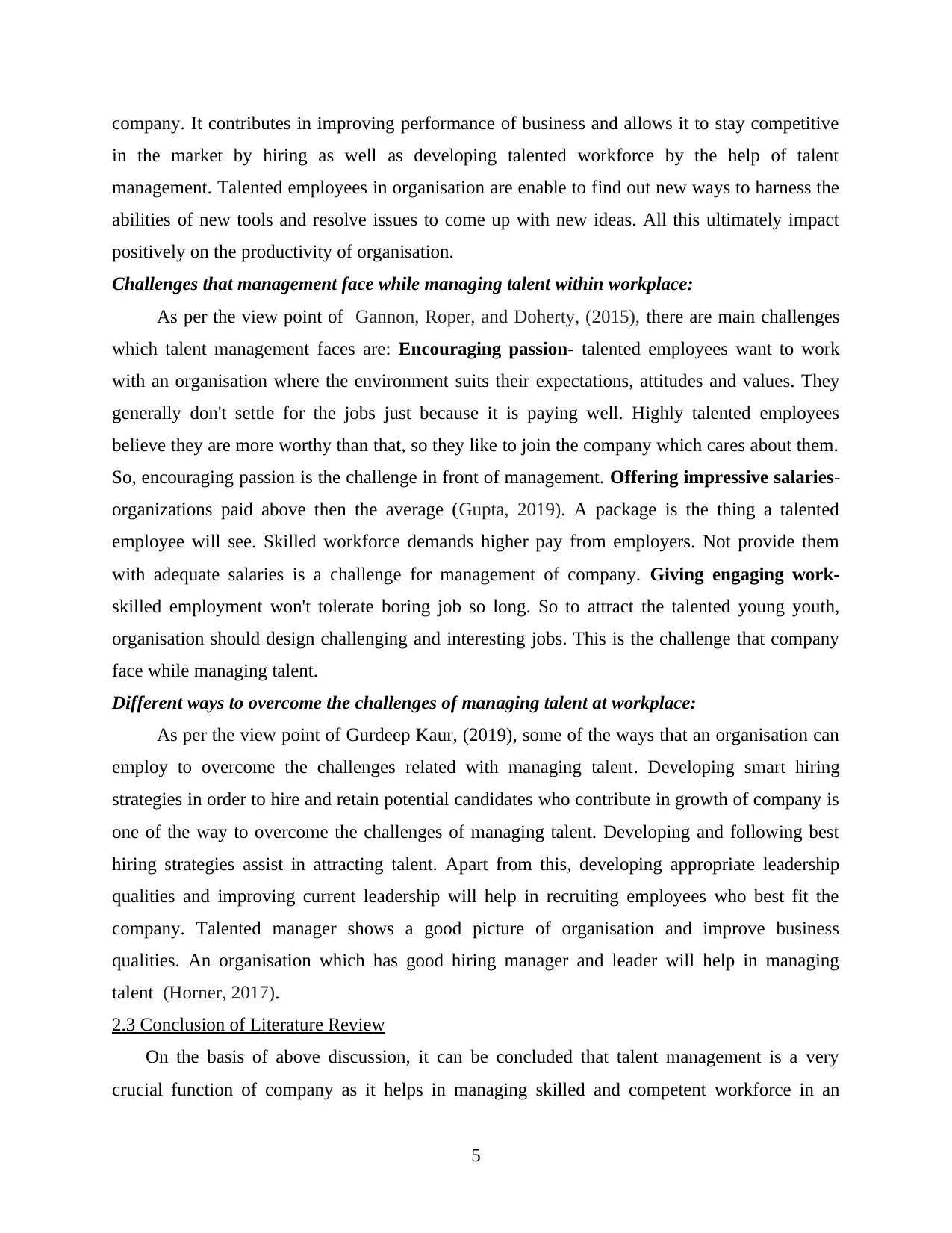
company. It contributes in improving performance of business and allows it to stay competitive
in the market by hiring as well as developing talented workforce by the help of talent
management. Talented employees in organisation are enable to find out new ways to harness the
abilities of new tools and resolve issues to come up with new ideas. All this ultimately impact
positively on the productivity of organisation.
Challenges that management face while managing talent within workplace:
As per the view point of Gannon, Roper, and Doherty, (2015), there are main challenges
which talent management faces are: Encouraging passion- talented employees want to work
with an organisation where the environment suits their expectations, attitudes and values. They
generally don't settle for the jobs just because it is paying well. Highly talented employees
believe they are more worthy than that, so they like to join the company which cares about them.
So, encouraging passion is the challenge in front of management. Offering impressive salaries-
organizations paid above then the average (Gupta, 2019). A package is the thing a talented
employee will see. Skilled workforce demands higher pay from employers. Not provide them
with adequate salaries is a challenge for management of company. Giving engaging work-
skilled employment won't tolerate boring job so long. So to attract the talented young youth,
organisation should design challenging and interesting jobs. This is the challenge that company
face while managing talent.
Different ways to overcome the challenges of managing talent at workplace:
As per the view point of Gurdeep Kaur, (2019), some of the ways that an organisation can
employ to overcome the challenges related with managing talent. Developing smart hiring
strategies in order to hire and retain potential candidates who contribute in growth of company is
one of the way to overcome the challenges of managing talent. Developing and following best
hiring strategies assist in attracting talent. Apart from this, developing appropriate leadership
qualities and improving current leadership will help in recruiting employees who best fit the
company. Talented manager shows a good picture of organisation and improve business
qualities. An organisation which has good hiring manager and leader will help in managing
talent (Horner, 2017).
2.3 Conclusion of Literature Review
On the basis of above discussion, it can be concluded that talent management is a very
crucial function of company as it helps in managing skilled and competent workforce in an
5
in the market by hiring as well as developing talented workforce by the help of talent
management. Talented employees in organisation are enable to find out new ways to harness the
abilities of new tools and resolve issues to come up with new ideas. All this ultimately impact
positively on the productivity of organisation.
Challenges that management face while managing talent within workplace:
As per the view point of Gannon, Roper, and Doherty, (2015), there are main challenges
which talent management faces are: Encouraging passion- talented employees want to work
with an organisation where the environment suits their expectations, attitudes and values. They
generally don't settle for the jobs just because it is paying well. Highly talented employees
believe they are more worthy than that, so they like to join the company which cares about them.
So, encouraging passion is the challenge in front of management. Offering impressive salaries-
organizations paid above then the average (Gupta, 2019). A package is the thing a talented
employee will see. Skilled workforce demands higher pay from employers. Not provide them
with adequate salaries is a challenge for management of company. Giving engaging work-
skilled employment won't tolerate boring job so long. So to attract the talented young youth,
organisation should design challenging and interesting jobs. This is the challenge that company
face while managing talent.
Different ways to overcome the challenges of managing talent at workplace:
As per the view point of Gurdeep Kaur, (2019), some of the ways that an organisation can
employ to overcome the challenges related with managing talent. Developing smart hiring
strategies in order to hire and retain potential candidates who contribute in growth of company is
one of the way to overcome the challenges of managing talent. Developing and following best
hiring strategies assist in attracting talent. Apart from this, developing appropriate leadership
qualities and improving current leadership will help in recruiting employees who best fit the
company. Talented manager shows a good picture of organisation and improve business
qualities. An organisation which has good hiring manager and leader will help in managing
talent (Horner, 2017).
2.3 Conclusion of Literature Review
On the basis of above discussion, it can be concluded that talent management is a very
crucial function of company as it helps in managing skilled and competent workforce in an
5
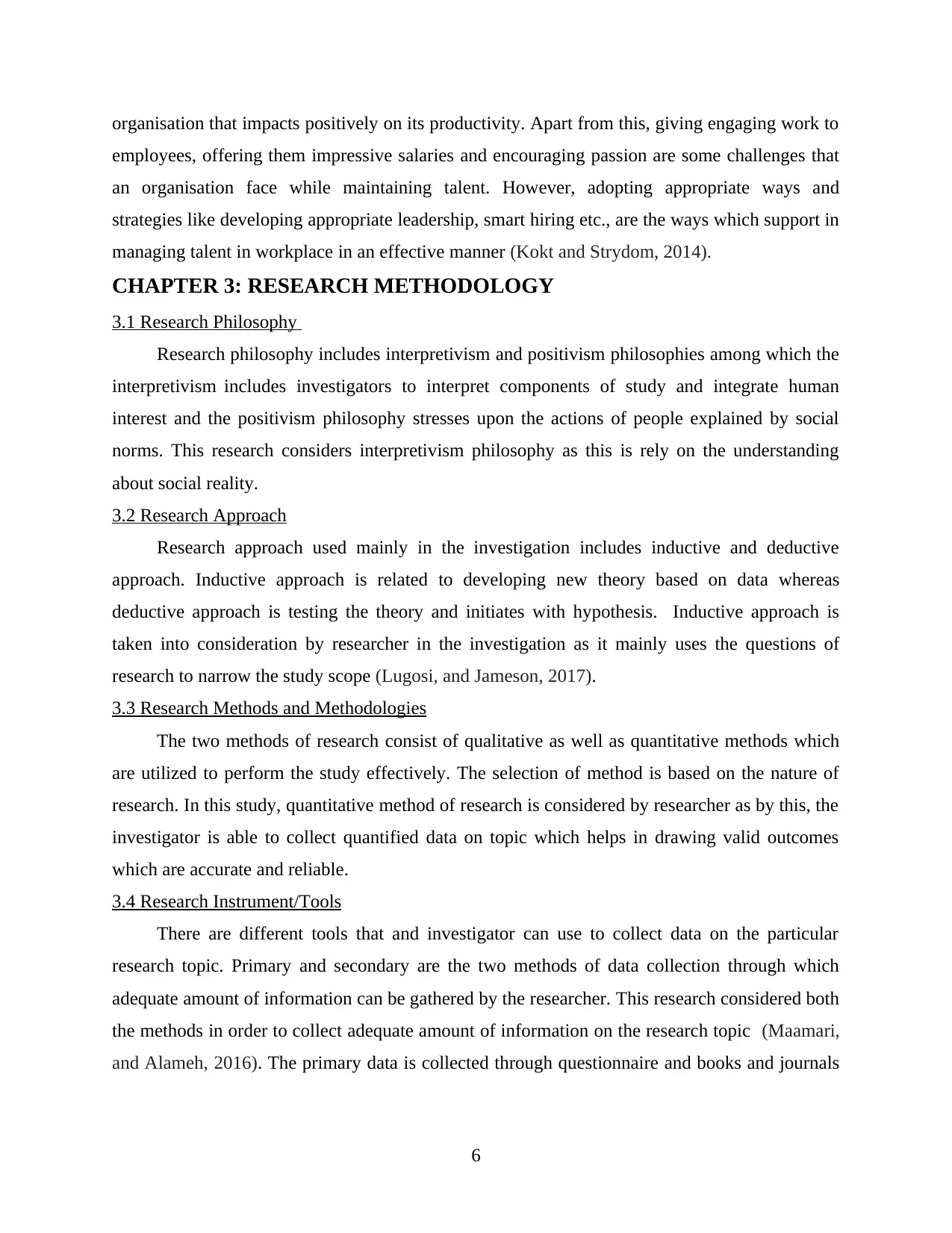
organisation that impacts positively on its productivity. Apart from this, giving engaging work to
employees, offering them impressive salaries and encouraging passion are some challenges that
an organisation face while maintaining talent. However, adopting appropriate ways and
strategies like developing appropriate leadership, smart hiring etc., are the ways which support in
managing talent in workplace in an effective manner (Kokt and Strydom, 2014).
CHAPTER 3: RESEARCH METHODOLOGY
3.1 Research Philosophy
Research philosophy includes interpretivism and positivism philosophies among which the
interpretivism includes investigators to interpret components of study and integrate human
interest and the positivism philosophy stresses upon the actions of people explained by social
norms. This research considers interpretivism philosophy as this is rely on the understanding
about social reality.
3.2 Research Approach
Research approach used mainly in the investigation includes inductive and deductive
approach. Inductive approach is related to developing new theory based on data whereas
deductive approach is testing the theory and initiates with hypothesis. Inductive approach is
taken into consideration by researcher in the investigation as it mainly uses the questions of
research to narrow the study scope (Lugosi, and Jameson, 2017).
3.3 Research Methods and Methodologies
The two methods of research consist of qualitative as well as quantitative methods which
are utilized to perform the study effectively. The selection of method is based on the nature of
research. In this study, quantitative method of research is considered by researcher as by this, the
investigator is able to collect quantified data on topic which helps in drawing valid outcomes
which are accurate and reliable.
3.4 Research Instrument/Tools
There are different tools that and investigator can use to collect data on the particular
research topic. Primary and secondary are the two methods of data collection through which
adequate amount of information can be gathered by the researcher. This research considered both
the methods in order to collect adequate amount of information on the research topic (Maamari,
and Alameh, 2016). The primary data is collected through questionnaire and books and journals
6
employees, offering them impressive salaries and encouraging passion are some challenges that
an organisation face while maintaining talent. However, adopting appropriate ways and
strategies like developing appropriate leadership, smart hiring etc., are the ways which support in
managing talent in workplace in an effective manner (Kokt and Strydom, 2014).
CHAPTER 3: RESEARCH METHODOLOGY
3.1 Research Philosophy
Research philosophy includes interpretivism and positivism philosophies among which the
interpretivism includes investigators to interpret components of study and integrate human
interest and the positivism philosophy stresses upon the actions of people explained by social
norms. This research considers interpretivism philosophy as this is rely on the understanding
about social reality.
3.2 Research Approach
Research approach used mainly in the investigation includes inductive and deductive
approach. Inductive approach is related to developing new theory based on data whereas
deductive approach is testing the theory and initiates with hypothesis. Inductive approach is
taken into consideration by researcher in the investigation as it mainly uses the questions of
research to narrow the study scope (Lugosi, and Jameson, 2017).
3.3 Research Methods and Methodologies
The two methods of research consist of qualitative as well as quantitative methods which
are utilized to perform the study effectively. The selection of method is based on the nature of
research. In this study, quantitative method of research is considered by researcher as by this, the
investigator is able to collect quantified data on topic which helps in drawing valid outcomes
which are accurate and reliable.
3.4 Research Instrument/Tools
There are different tools that and investigator can use to collect data on the particular
research topic. Primary and secondary are the two methods of data collection through which
adequate amount of information can be gathered by the researcher. This research considered both
the methods in order to collect adequate amount of information on the research topic (Maamari,
and Alameh, 2016). The primary data is collected through questionnaire and books and journals
6
⊘ This is a preview!⊘
Do you want full access?
Subscribe today to unlock all pages.

Trusted by 1+ million students worldwide
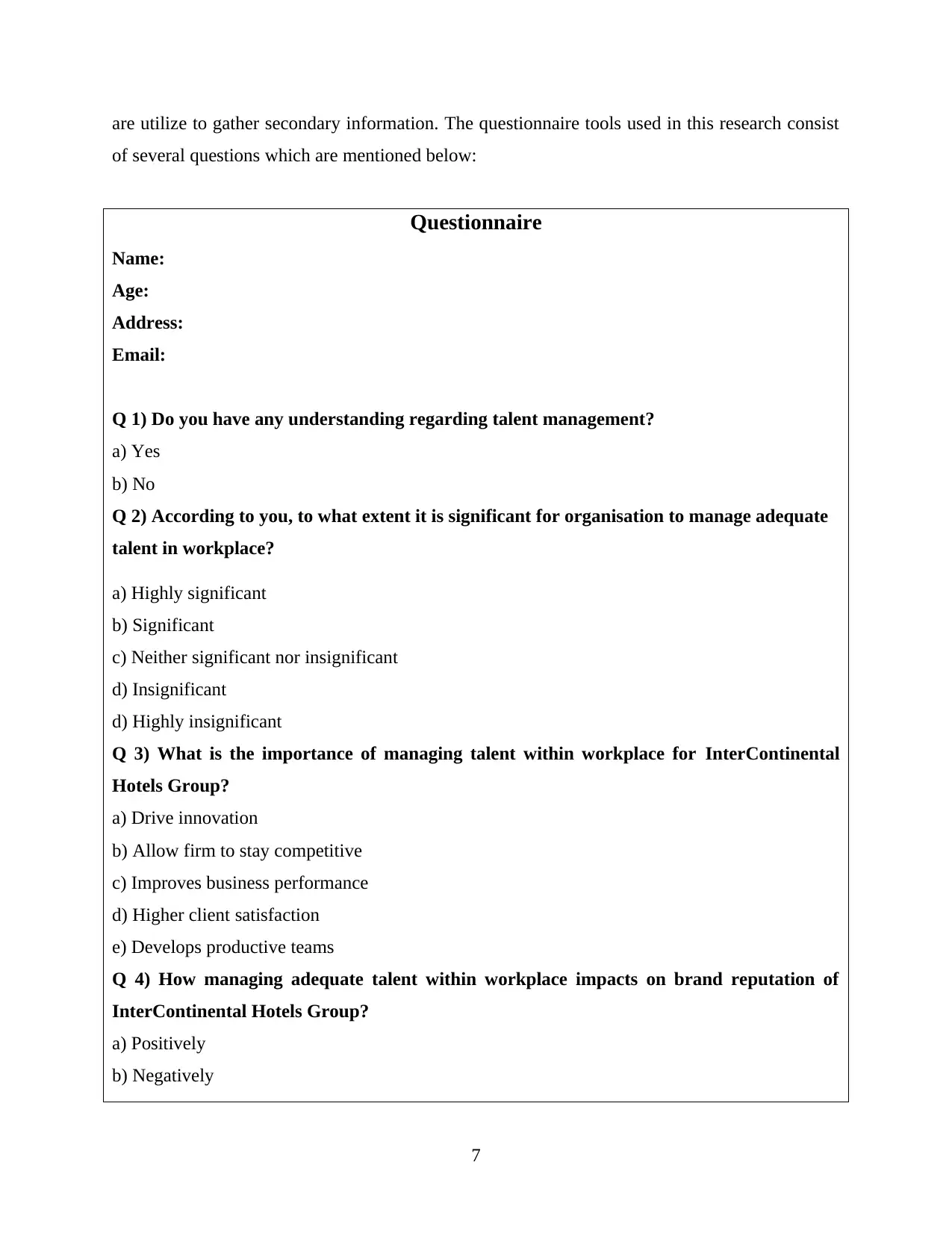
are utilize to gather secondary information. The questionnaire tools used in this research consist
of several questions which are mentioned below:
Questionnaire
Name:
Age:
Address:
Email:
Q 1) Do you have any understanding regarding talent management?
a) Yes
b) No
Q 2) According to you, to what extent it is significant for organisation to manage adequate
talent in workplace?
a) Highly significant
b) Significant
c) Neither significant nor insignificant
d) Insignificant
d) Highly insignificant
Q 3) What is the importance of managing talent within workplace for InterContinental
Hotels Group?
a) Drive innovation
b) Allow firm to stay competitive
c) Improves business performance
d) Higher client satisfaction
e) Develops productive teams
Q 4) How managing adequate talent within workplace impacts on brand reputation of
InterContinental Hotels Group?
a) Positively
b) Negatively
7
of several questions which are mentioned below:
Questionnaire
Name:
Age:
Address:
Email:
Q 1) Do you have any understanding regarding talent management?
a) Yes
b) No
Q 2) According to you, to what extent it is significant for organisation to manage adequate
talent in workplace?
a) Highly significant
b) Significant
c) Neither significant nor insignificant
d) Insignificant
d) Highly insignificant
Q 3) What is the importance of managing talent within workplace for InterContinental
Hotels Group?
a) Drive innovation
b) Allow firm to stay competitive
c) Improves business performance
d) Higher client satisfaction
e) Develops productive teams
Q 4) How managing adequate talent within workplace impacts on brand reputation of
InterContinental Hotels Group?
a) Positively
b) Negatively
7
Paraphrase This Document
Need a fresh take? Get an instant paraphrase of this document with our AI Paraphraser
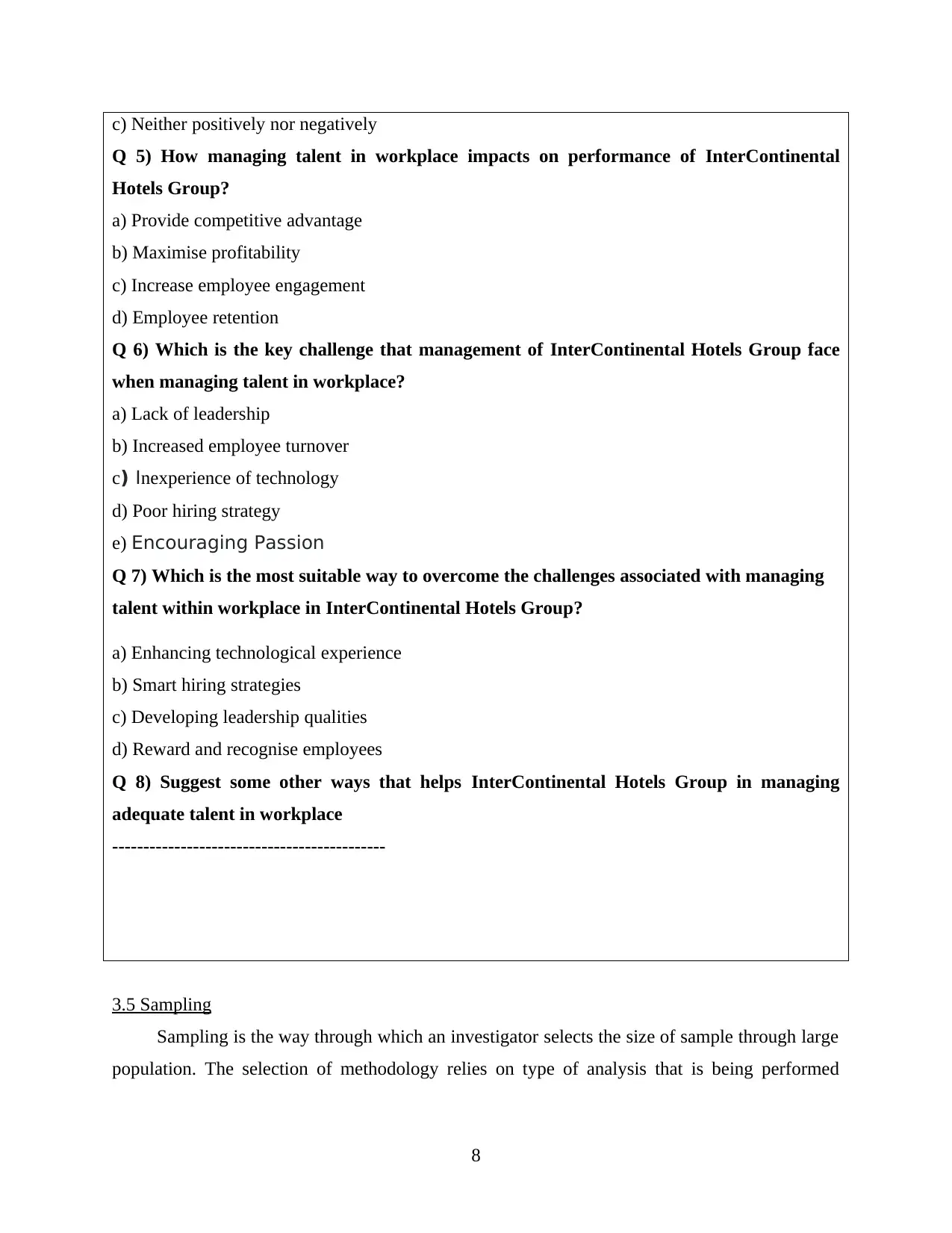
c) Neither positively nor negatively
Q 5) How managing talent in workplace impacts on performance of InterContinental
Hotels Group?
a) Provide competitive advantage
b) Maximise profitability
c) Increase employee engagement
d) Employee retention
Q 6) Which is the key challenge that management of InterContinental Hotels Group face
when managing talent in workplace?
a) Lack of leadership
b) Increased employee turnover
c) Inexperience of technology
d) Poor hiring strategy
e) Encouraging Passion
Q 7) Which is the most suitable way to overcome the challenges associated with managing
talent within workplace in InterContinental Hotels Group?
a) Enhancing technological experience
b) Smart hiring strategies
c) Developing leadership qualities
d) Reward and recognise employees
Q 8) Suggest some other ways that helps InterContinental Hotels Group in managing
adequate talent in workplace
--------------------------------------------
3.5 Sampling
Sampling is the way through which an investigator selects the size of sample through large
population. The selection of methodology relies on type of analysis that is being performed
8
Q 5) How managing talent in workplace impacts on performance of InterContinental
Hotels Group?
a) Provide competitive advantage
b) Maximise profitability
c) Increase employee engagement
d) Employee retention
Q 6) Which is the key challenge that management of InterContinental Hotels Group face
when managing talent in workplace?
a) Lack of leadership
b) Increased employee turnover
c) Inexperience of technology
d) Poor hiring strategy
e) Encouraging Passion
Q 7) Which is the most suitable way to overcome the challenges associated with managing
talent within workplace in InterContinental Hotels Group?
a) Enhancing technological experience
b) Smart hiring strategies
c) Developing leadership qualities
d) Reward and recognise employees
Q 8) Suggest some other ways that helps InterContinental Hotels Group in managing
adequate talent in workplace
--------------------------------------------
3.5 Sampling
Sampling is the way through which an investigator selects the size of sample through large
population. The selection of methodology relies on type of analysis that is being performed
8
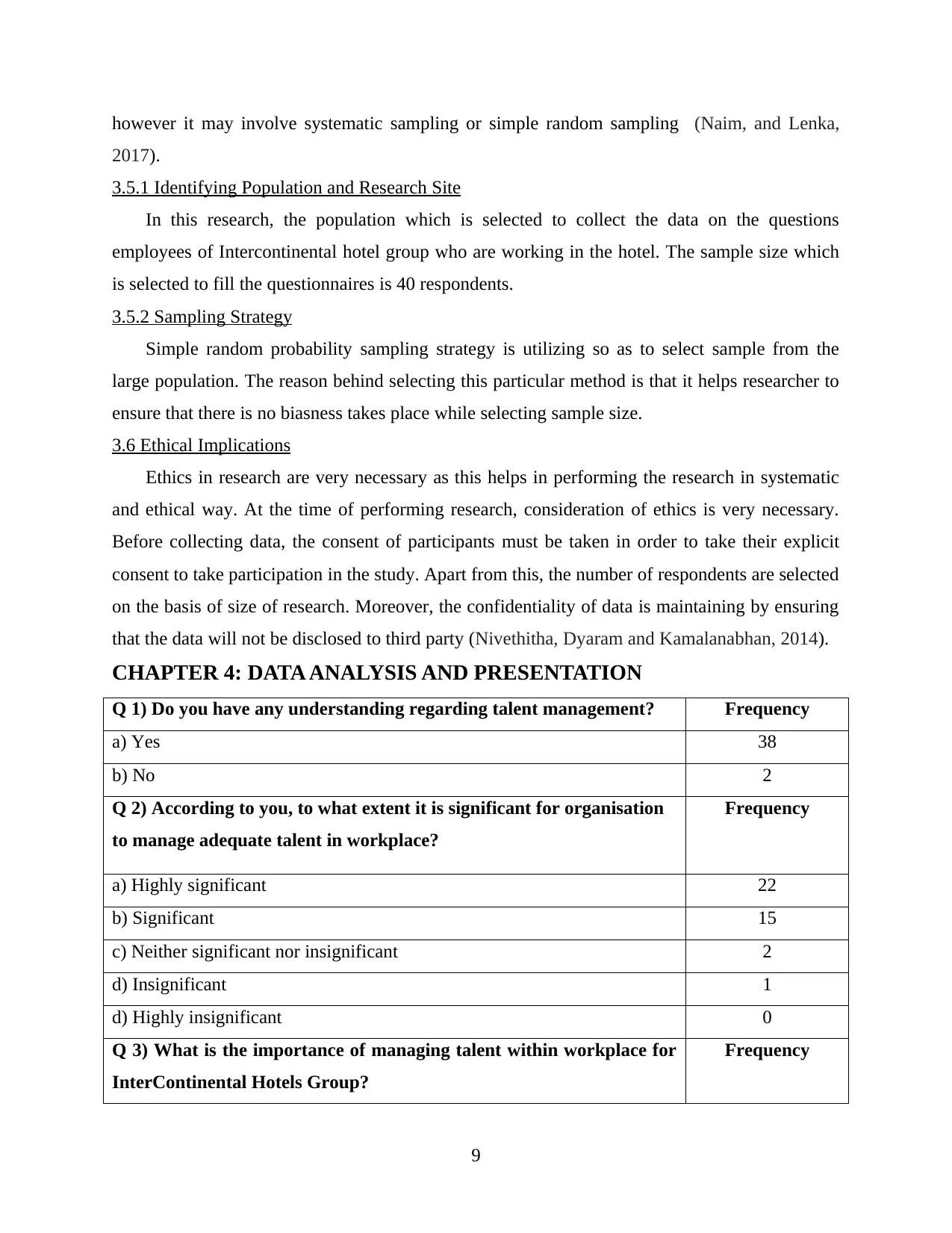
however it may involve systematic sampling or simple random sampling (Naim, and Lenka,
2017).
3.5.1 Identifying Population and Research Site
In this research, the population which is selected to collect the data on the questions
employees of Intercontinental hotel group who are working in the hotel. The sample size which
is selected to fill the questionnaires is 40 respondents.
3.5.2 Sampling Strategy
Simple random probability sampling strategy is utilizing so as to select sample from the
large population. The reason behind selecting this particular method is that it helps researcher to
ensure that there is no biasness takes place while selecting sample size.
3.6 Ethical Implications
Ethics in research are very necessary as this helps in performing the research in systematic
and ethical way. At the time of performing research, consideration of ethics is very necessary.
Before collecting data, the consent of participants must be taken in order to take their explicit
consent to take participation in the study. Apart from this, the number of respondents are selected
on the basis of size of research. Moreover, the confidentiality of data is maintaining by ensuring
that the data will not be disclosed to third party (Nivethitha, Dyaram and Kamalanabhan, 2014).
CHAPTER 4: DATA ANALYSIS AND PRESENTATION
Q 1) Do you have any understanding regarding talent management? Frequency
a) Yes 38
b) No 2
Q 2) According to you, to what extent it is significant for organisation
to manage adequate talent in workplace?
Frequency
a) Highly significant 22
b) Significant 15
c) Neither significant nor insignificant 2
d) Insignificant 1
d) Highly insignificant 0
Q 3) What is the importance of managing talent within workplace for
InterContinental Hotels Group?
Frequency
9
2017).
3.5.1 Identifying Population and Research Site
In this research, the population which is selected to collect the data on the questions
employees of Intercontinental hotel group who are working in the hotel. The sample size which
is selected to fill the questionnaires is 40 respondents.
3.5.2 Sampling Strategy
Simple random probability sampling strategy is utilizing so as to select sample from the
large population. The reason behind selecting this particular method is that it helps researcher to
ensure that there is no biasness takes place while selecting sample size.
3.6 Ethical Implications
Ethics in research are very necessary as this helps in performing the research in systematic
and ethical way. At the time of performing research, consideration of ethics is very necessary.
Before collecting data, the consent of participants must be taken in order to take their explicit
consent to take participation in the study. Apart from this, the number of respondents are selected
on the basis of size of research. Moreover, the confidentiality of data is maintaining by ensuring
that the data will not be disclosed to third party (Nivethitha, Dyaram and Kamalanabhan, 2014).
CHAPTER 4: DATA ANALYSIS AND PRESENTATION
Q 1) Do you have any understanding regarding talent management? Frequency
a) Yes 38
b) No 2
Q 2) According to you, to what extent it is significant for organisation
to manage adequate talent in workplace?
Frequency
a) Highly significant 22
b) Significant 15
c) Neither significant nor insignificant 2
d) Insignificant 1
d) Highly insignificant 0
Q 3) What is the importance of managing talent within workplace for
InterContinental Hotels Group?
Frequency
9
⊘ This is a preview!⊘
Do you want full access?
Subscribe today to unlock all pages.

Trusted by 1+ million students worldwide
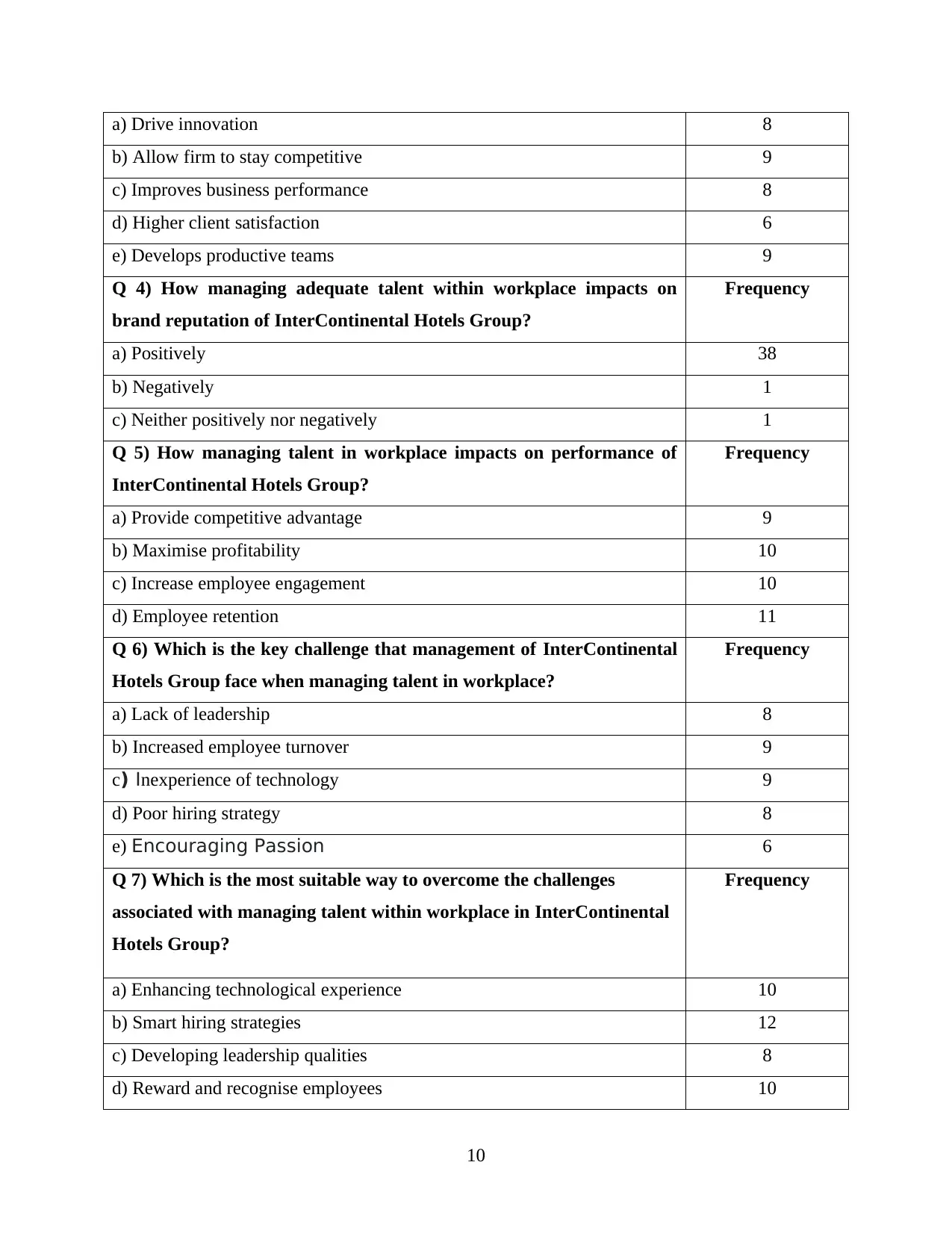
a) Drive innovation 8
b) Allow firm to stay competitive 9
c) Improves business performance 8
d) Higher client satisfaction 6
e) Develops productive teams 9
Q 4) How managing adequate talent within workplace impacts on
brand reputation of InterContinental Hotels Group?
Frequency
a) Positively 38
b) Negatively 1
c) Neither positively nor negatively 1
Q 5) How managing talent in workplace impacts on performance of
InterContinental Hotels Group?
Frequency
a) Provide competitive advantage 9
b) Maximise profitability 10
c) Increase employee engagement 10
d) Employee retention 11
Q 6) Which is the key challenge that management of InterContinental
Hotels Group face when managing talent in workplace?
Frequency
a) Lack of leadership 8
b) Increased employee turnover 9
c) Inexperience of technology 9
d) Poor hiring strategy 8
e) Encouraging Passion 6
Q 7) Which is the most suitable way to overcome the challenges
associated with managing talent within workplace in InterContinental
Hotels Group?
Frequency
a) Enhancing technological experience 10
b) Smart hiring strategies 12
c) Developing leadership qualities 8
d) Reward and recognise employees 10
10
b) Allow firm to stay competitive 9
c) Improves business performance 8
d) Higher client satisfaction 6
e) Develops productive teams 9
Q 4) How managing adequate talent within workplace impacts on
brand reputation of InterContinental Hotels Group?
Frequency
a) Positively 38
b) Negatively 1
c) Neither positively nor negatively 1
Q 5) How managing talent in workplace impacts on performance of
InterContinental Hotels Group?
Frequency
a) Provide competitive advantage 9
b) Maximise profitability 10
c) Increase employee engagement 10
d) Employee retention 11
Q 6) Which is the key challenge that management of InterContinental
Hotels Group face when managing talent in workplace?
Frequency
a) Lack of leadership 8
b) Increased employee turnover 9
c) Inexperience of technology 9
d) Poor hiring strategy 8
e) Encouraging Passion 6
Q 7) Which is the most suitable way to overcome the challenges
associated with managing talent within workplace in InterContinental
Hotels Group?
Frequency
a) Enhancing technological experience 10
b) Smart hiring strategies 12
c) Developing leadership qualities 8
d) Reward and recognise employees 10
10
Paraphrase This Document
Need a fresh take? Get an instant paraphrase of this document with our AI Paraphraser
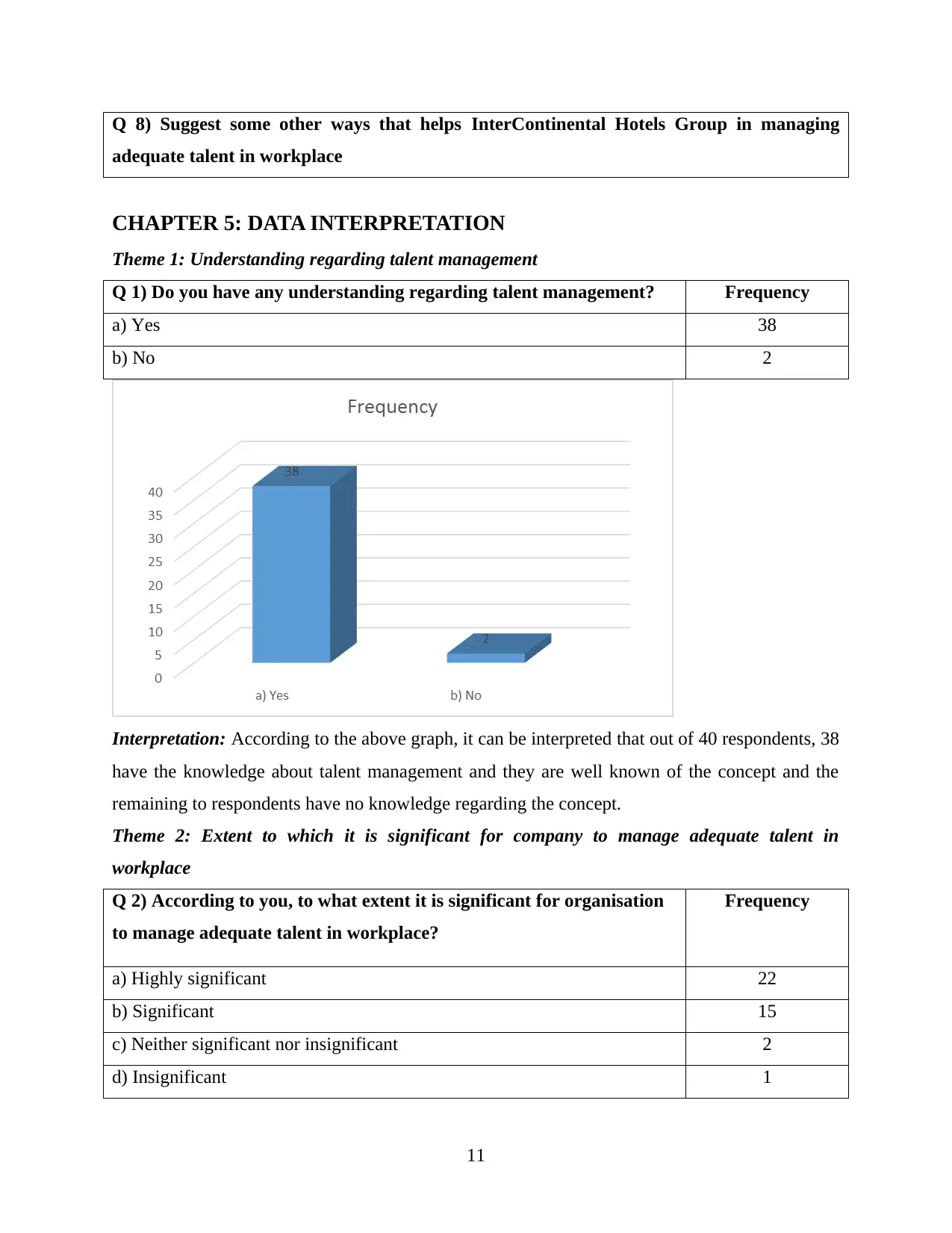
Q 8) Suggest some other ways that helps InterContinental Hotels Group in managing
adequate talent in workplace
CHAPTER 5: DATA INTERPRETATION
Theme 1: Understanding regarding talent management
Q 1) Do you have any understanding regarding talent management? Frequency
a) Yes 38
b) No 2
Interpretation: According to the above graph, it can be interpreted that out of 40 respondents, 38
have the knowledge about talent management and they are well known of the concept and the
remaining to respondents have no knowledge regarding the concept.
Theme 2: Extent to which it is significant for company to manage adequate talent in
workplace
Q 2) According to you, to what extent it is significant for organisation
to manage adequate talent in workplace?
Frequency
a) Highly significant 22
b) Significant 15
c) Neither significant nor insignificant 2
d) Insignificant 1
11
adequate talent in workplace
CHAPTER 5: DATA INTERPRETATION
Theme 1: Understanding regarding talent management
Q 1) Do you have any understanding regarding talent management? Frequency
a) Yes 38
b) No 2
Interpretation: According to the above graph, it can be interpreted that out of 40 respondents, 38
have the knowledge about talent management and they are well known of the concept and the
remaining to respondents have no knowledge regarding the concept.
Theme 2: Extent to which it is significant for company to manage adequate talent in
workplace
Q 2) According to you, to what extent it is significant for organisation
to manage adequate talent in workplace?
Frequency
a) Highly significant 22
b) Significant 15
c) Neither significant nor insignificant 2
d) Insignificant 1
11
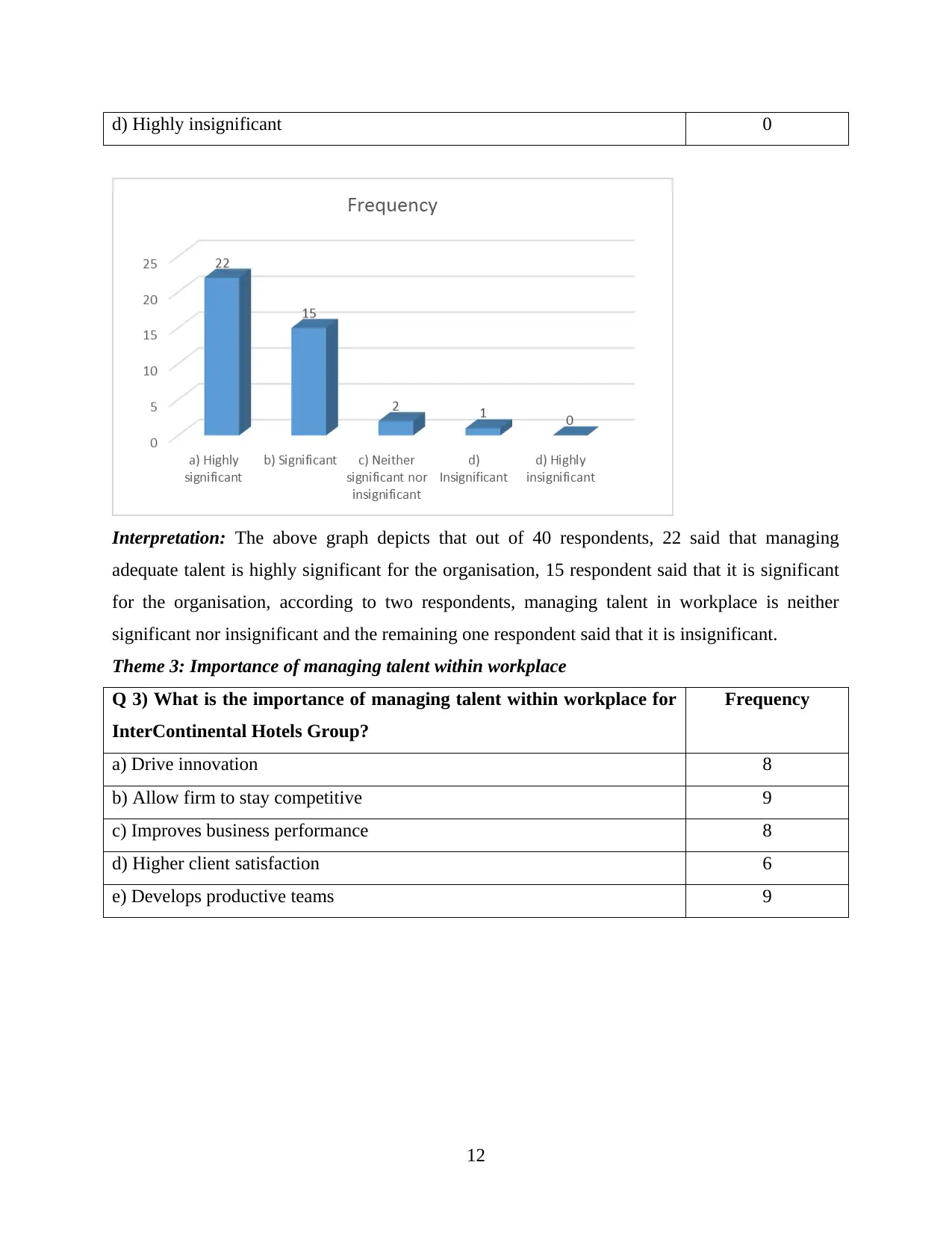
d) Highly insignificant 0
Interpretation: The above graph depicts that out of 40 respondents, 22 said that managing
adequate talent is highly significant for the organisation, 15 respondent said that it is significant
for the organisation, according to two respondents, managing talent in workplace is neither
significant nor insignificant and the remaining one respondent said that it is insignificant.
Theme 3: Importance of managing talent within workplace
Q 3) What is the importance of managing talent within workplace for
InterContinental Hotels Group?
Frequency
a) Drive innovation 8
b) Allow firm to stay competitive 9
c) Improves business performance 8
d) Higher client satisfaction 6
e) Develops productive teams 9
12
Interpretation: The above graph depicts that out of 40 respondents, 22 said that managing
adequate talent is highly significant for the organisation, 15 respondent said that it is significant
for the organisation, according to two respondents, managing talent in workplace is neither
significant nor insignificant and the remaining one respondent said that it is insignificant.
Theme 3: Importance of managing talent within workplace
Q 3) What is the importance of managing talent within workplace for
InterContinental Hotels Group?
Frequency
a) Drive innovation 8
b) Allow firm to stay competitive 9
c) Improves business performance 8
d) Higher client satisfaction 6
e) Develops productive teams 9
12
⊘ This is a preview!⊘
Do you want full access?
Subscribe today to unlock all pages.

Trusted by 1+ million students worldwide
1 out of 19
Related Documents
Your All-in-One AI-Powered Toolkit for Academic Success.
+13062052269
info@desklib.com
Available 24*7 on WhatsApp / Email
![[object Object]](/_next/static/media/star-bottom.7253800d.svg)
Unlock your academic potential
Copyright © 2020–2026 A2Z Services. All Rights Reserved. Developed and managed by ZUCOL.




